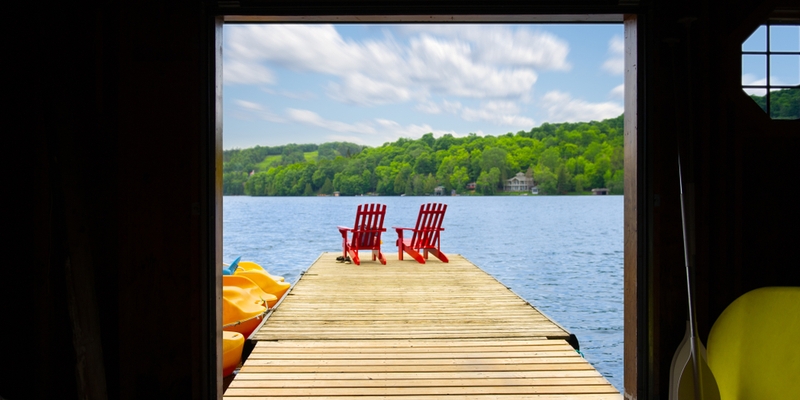
If you are not redirected within 30 seconds, please click here to continue.
Samedi: 10h – 16h HAE

If you are not redirected within 30 seconds, please click here to continue.
If you are not redirected within 30 seconds, please click here to continue.
Table of Contents
This article has been updated from a previous version.
The summer cottage season is here, and Canadians’ enthusiasm for escaping the city to quieter digs in cottage country is alive and well.
If you don't own a cottage and are keen to rent one to experience a taste of northern living this summer, expect to pay competitive rental prices in 2023.
If you're a cottage owner, renting out your cottage to others when you're not there can help rake in a few extra bucks. However, renting can be a tricky business; both sides want to get great value without too much fuss. Here are a few suggestions for both property owners and renters to bear in mind.
What to know about renting out your cottage
Owning a second property is expensive and renting out your cottage when you’re not using it makes good financial sense. But there’s much to do to get things ready for rental, including:
- Check rental listings for your area to set a competitive price. Peruse local rental listings to get a sense of what other property owners ask for when renting their digs. Is your cottage on the waterfront with a beach? How many bedrooms does it have? Is your cottage outfitted with modern appliances and internet access? All these factors should be considered when setting a price.
- Clean up. You need to store your personal belongings and be sure anything you do have at your cottage you could live without. That means taking home items you value such as a fancy stereo system. The more basic the amenities in your cottage, the less you have to lose in case something gets stolen or broken.
- Set guidelines. Establish clear and concise rules for renters to follow that are easy to understand. You may want to ask guests for a damage deposit to protect your property, and it’s worthwhile to screen potential renters by asking a few questions before you accept a booking.
- Be safe. Many renters are families, so they will be looking for a childproof cottage free of hidden hazards. Be sure you have gates for the docks and railings on the deck. Even little things like placing a rubber mat in the shower can prevent someone from falling and getting injured, and in turn, suing you for damages.
- Get insured. Call your home insurance company to be sure your property is adequately covered to rent. If not, it might be time to compare home insurance rates and switch providers.
- Get help. A property management company can help supervise your property if you plan on renting your cottage multiple times in a year. It may be worthwhile to hire a professional cleaning service to scrub the dwelling clean after each renter.
- Smart marketing. Take quality photos of the property and post an online summary of your second home with detailed descriptions of what makes it unique. If you're running things off your own website, use online tools such as a booking calendar to make bookings easier.
- Use a secure payment system. You need to safeguard yourself from fraud when conducting financial transactions. Consider using an online platform that provides booking services and protection against fraudulent credit card transactions such as Vrbo.
Read more: Airbnb and Insurance: What You Need to Know Before Renting Out Your Home
What to know as a renter
It can be difficult to find a great cottage to rent. You have to look beyond what’s on a cottage’s webpage and be able to anticipate what you’ll need and want from a rental. Here are a few tips for getting the most value out of your rental:
- Book early. The best spots are long gone by mid-winter, and this year could prove tougher. When you book last minute, you get the spots few people want.
- Ask around. Before you shop online for a cottage, ask friends and relatives where they have rented before. You might find a tried-and-true gem. If that fails, visit cottage rental sites for the area you want so you can compare properties and rental rates.
- Read between the lines. If water is “nearby” that means it's not a waterfront property. “Deep water access” means the kids will have to jump off the dock if they want to swim. “Cozy” or “rustic” might mean it is somewhat small or broken down.
- Know your deal breakers. If you need a nice kitchen to be able to enjoy yourself, call and ask detailed questions about the countertops and stove. If you want beach access, don’t be satisfied with “well, there’s a little sandy area.”
- Consider amenities. Having things like a powerboat or paddle boat for use, a hot tub, beach, playground — all these things add to your enjoyment of a property. Since it may rain while you’re there, look at what’s on the property and nearby in town for those drizzly days.
- You get what you pay for. It’s smart to look for an affordable cottage to rent. But by preparing to spend a little more, you can often get a nicer property with more comfy beds and a decent bathroom.
- Go off the beaten path. Every province has a popular cottage country region. Rental costs in those areas will be pricey. Look for a property in a less hip region that still promises warm temperatures, clear lakes, and great views. As a bonus, getting a meal from a restaurant or shopping in that region is probably cheaper too.
- Protect your home while away. Home invasions and burglaries tend to increase in the summertime. You need to protect your digs while on vacation by taking a few precautions. That includes refraining from advertising on social media that you’re away from home and having a family member or trusted friend visit your house occasionally to check on it until you return.
If a cottage getaway is on your list this summer, be picky and do your research to be sure what you spend is worth it. And if you travel outside of your home province to a cottage as pandemic restrictions loosen, don’t forget to buy a travel insurance policy to protect yourself and your family.
Don't waste time calling around for home insurance
Use RATESDOTCA to shop around and compare multiple quotes at the same time.
Finding the best home insurance coverage has never been so easy!
Get money-saving tips in your inbox.
Stay on top of personal finance tips from our money experts!











